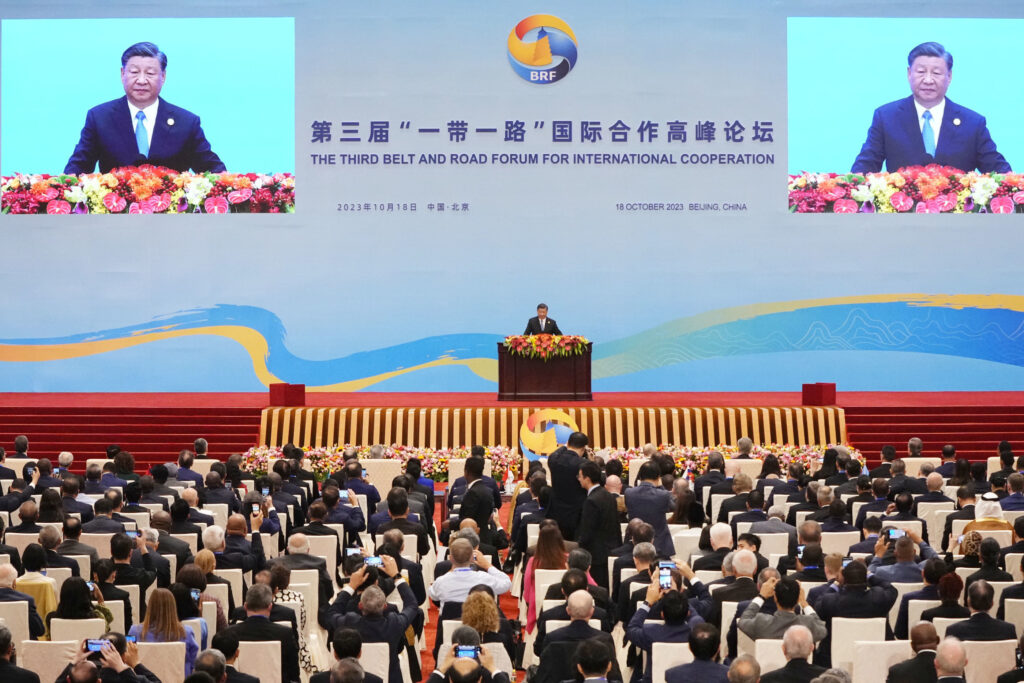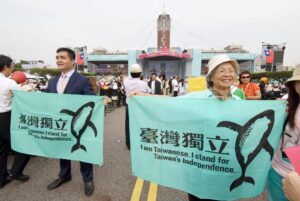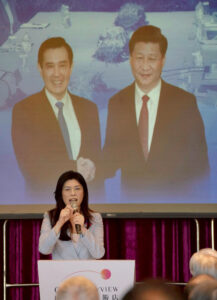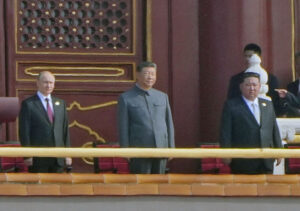Commentary
China Today:The Xi Jinping Administration Faces Various Dilemmas

First of all I would like to thank the organisers for providing me with this wonderful opportunity to share my observations on China with such a fantastic group of people. I hope you are a little tipsy and happy enough to bear the next 15 minutes listening to a story on a very difficult topic, China.
The approach I adopt tonight in discussing the current state of affairs in China and our relations with it, is to present several dilemmas that the Xi Jinping administration is facing.
First, we all know that the Chinese economy is in deep trouble. Certainly, some industries are doing well, such as EVs and renewable energy, but overall it is widely acknowledged that there is excessive production capacity and people’s confidence in the future is at a rather low level, leading to a decline in private investment and weak consumption. There are many reasons for this, including the lack of the engine of growth. Now the local governments cannot count on real estate development and many of them are in dire fiscal straits. Because of the failure of the zero-COVID policy, many people have lost confidence in the regime and its leader.
In addition, it seems to me that there is another fundamental systemic problem and that is the contradiction between marketisation and socialism, or contradiction between economics and politics. The former paramount leader Deng Xiaoping well understood that socialism in East European countries and the Soviet Union failed because they failed in economics. So in the wake of the demise of the Soviet Communist Party Deng Xiaoping revised the orthodox ideology, took off the signboard of planned economy and threw it out of the window, and declared that China would aim for a socialist market economic system.
The current leader Xi Jinping has also said that the market will play the central role in the Chinese economy. At the same time, however, he revived the line that Mao Zedong used, that is “East, West, North and South and Centre, the Party leads all”. There are so many hours of study sessions on Xi Jinping Thought that the cadres must attend each week. Now it is the Party bureaucracy that makes decisions on finance. Xi Jinping cannot trust huge, private internet platforms. He repeatedly tries to assure private firms that they will be treated fairly, but that instruction doesn’t get implemented, or at least that is what the private entrepreneurs think and strongly complain about. As for the banks, they are also facing a dilemma. Should they deleverage and be prudent in giving out loans, or should they actively promote the businesses of small and medium enterprises? They are told to do both of these at the same time.
Well, ever since the introduction of the market there has been a serious debate inside the Party between the reformists and the conservatives. For the survival of the Party, that is for securing the support of the masses, the Party needs more systemic reforms. But the conservatives argue that they should maintain the state-owned enterprises since they are the foundation of power. Which side is right? They are both right. You may have noticed that last autumn the CCP did not hold the Third Plenum of the central committee. Every once in five years the third plenum serves as the platform for the Party to announce the direction of reform in the following years to come. I tend to believe that there is an intense debate about the direction of reforms and Xi Jinping just cannot make a decision on which way to go.
Although Xi Jinping’s one-man rule is firmly established, I observe his indecisiveness in personnel appointments, too. The key position of the Director of the Party Central Office, who serve as a kind of a chief secretary to Xi, was vacant for five months before Xi’s close confidant Cai Qi was appointed. After the Defence Minister by the name of Li Shangfu stopped showing up in public events last summer, it took Xi Jinping two months to formally remove him from his position, and it took another two months to appoint a new Defence Minister.
Despite all the dilemmas and contradictions, however, we know that the Chinese economy grew miraculously fast in the past three to four decades. We should never underestimate its resilience. But as a result of its rise, the intentions in China’s external policies have changed, causing alarm overseas. Now Xi Jinping says internally that it is imperative to become a sea power as well as a land power, and says openly that the globe, no longer the Pacific only but the globe, is big enough for the United States of America and China to coexist. He has identified himself as a leader that made China a powerful nation. Ironically, however, the more China becomes powerful, the more Xi Jinping is worried about its national security. The CCP leaders know they lack the legitimacy to rule. Deng Xiaoping said, “Development is the absolute truth”. That is, economic growth will solve, or at least suppress, all the problems and contradictions that threaten the stability of the society and the regime. But for Xi, national security is no less important than development. The anti-espionage law, for example, and the tightening of media and social control in general, is affecting the business environment and the willingness of foreign firms to take the risk and come to China, and it is dampening the vibrancy of the economy and society.
What’s most important for Xi is to maintain the regime and his power. Taiwan unification is not his top priority. In the future, if he finds unifying Taiwan contributes to maintaining the regime, he will invade. But it’s unlikely that he will make that judgment in the near future.
In foreign policies, China also faces a big dilemma. On the one hand, Xi Jinping has to support Vladimir Putin, even though Xi probably does not agree with Putin’s invasion of Ukraine. A high-ranking official of the Chinese government visited Japan last year and told us the reason why China supports Russia, using the metaphor of the Romance of the Three Kingdoms. In 3rd century China, three kingdoms, Wei, Wu and Shu were contesting. This official said, “You Japanese like the Romance of the Three Kingdoms, right? You know, even though Wu and Shu have contradictions between them, they still need each other. You understand.” What he meant was, both Russia and China need each other despite their contradictions, in order to survive and win the competition with the bigger rival, the United States. So in September 2022, then CCP No.3 leader called Li Zhanshu, who used to be the chairman of the National People’s Congress, told his counterpart in Moscow that China understands and supports Russia and that China is providing assistance in the war with Ukraine. For most of the Europeans, Americans, Japanese and other nations, China’s support for Russia in the war with Ukraine is totally unacceptable.
On the other hand, the downturn of the economy has pressured China to approach those developed democracies and embark on a charm offensive. My Chinese friends would say, “The stability of our relations with the United States is the basis for the stability of everything in China.” China is trying to decrease the level of their economic dependence on potential adversaries but they know they still need the investments and technology from the US, Europe, Japan, and other countries. But this balancing act between Russia and us is very difficult and almost impossible.
As far as Japan-China relations are concerned, China’s policies are incredibly inconsistent from our point of view. Last year, the official media resumed their argument that the international status of Okinawa is undecided, since China has not signed the 1951 San Francisco Peace Treaty. Some scholars have stopped using the name Okinawa, and started calling it Ryukyu, which is a grave challenge to the post-WW2 international order. Also last year, the Chinese media and the Foreign Ministry hysterically criticised Japan for releasing the treated water from the Fukushima No.1 nuclear power plant into the ocean. Although I’m not a scientist myself, I thought this critique was rather unscientific and irrational. A Chinese Foreign Ministry spokesperson said that the water must be contaminated because the Japanese government decided to provide subsidies to the Fukushima fishermen for the decrease in their sales. Well, if people did not buy the fish because of harmful rumour then he was one of the culprits. Another big issue has been the arrest of a Japanese pharmaceutical company executive apparently charged with espionage. This is another example reflecting the dilemma between national security and development. On the other hand, a large number of local government missions have come to lure investments from Japan. And in the long run, if they really wanted to win the strategic competition with the United States, they know they must get Japan on their side. The Chinese say they want to improve relations with Japan. But what they do is attempt to change the status quo by physical force in the East and South China Seas.
From what I have told you, China clearly faces a lot of dilemmas, both internal and external, but actually, so do we in dealing with China. The security experts would say, “There’s no way we cooperate with China. If we did, we would make China more powerful. We must not cooperate with it.” But the economists and the business people would say, “If we did not cooperate with China, what will happen to our economy? Do you think we still would be able to compete with China? No way!” Which side is correct? Both are correct. So Japan for many years has been implementing a two-pronged approach of competing and cooperating with China at the same time. It is a contradictory approach, but we need the wisdom and resilience to live with this contradiction. For some, the two-pronged approach is psychologically unacceptable. And the dilemma will be felt more acutely as time goes by, since competition is likely to intensify, while cooperation widens and deepens. But this is the same for China. They also need to compete and cooperate with us simultaneously.
In order to strike the right balance, any country needs a politician with a broad and solid power base. He or she must be able to persuade both the hawks and the doves to go the middle way. But that’s not an easy task. I’m afraid the difficulty in stabilising our relations with China is likely to continue. And needless to say, partnerships with like-minded countries, like the one between the UK and Japan, are so important in facing this common challenge.






